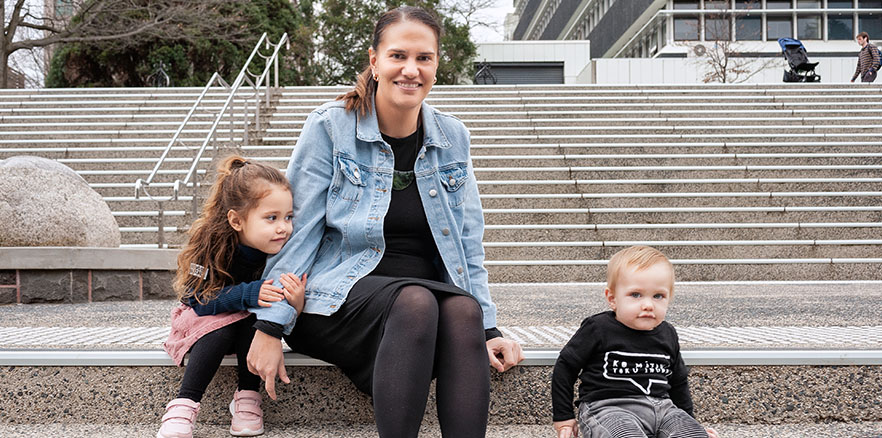
Associate Professor Karyn Paringatai with her daughter Manuhou and son Mātahi
You would be hard pressed to find an academic career more life-imprinted than that of Associate Professor Karyn Paringatai (Te Tumu – School of Māori, Pacific and Indigenous Studies).
“Whakapapa finally became real, tangible and life-saving.”
Everything she teaches and researches within Māori Studies (language acquisition, pedagogies, performing arts, the impact of whakapapa knowledge on health outcomes and the socio-cultural aspects of Māori migration) stems from the deep cultural yearning she felt while growing up in Southland away from intergenerational contact with her Ngāti Porou iwi.
“A lot of my work is about my own personal journey. I grew up in Invercargill disconnected from my East Coast whakapapa. But I did nothing to sever that connection. It was always there – I just had to find it.”
That finding took a while.
“I was 11 when I first realised I should engage with it, but it took 10 years before I started to do so. I was just too scared and didn't have the confidence.”
That trepidation proved useful; it grew an educator who was guided by instinct and a strong sense of empathy – traits that helped win her several teaching awards.
While taking a Māori performing arts class, Paringatai began using a method of teaching haka and waiata that eliminated the sense of language-fumbling embarrassment many of her students felt: she turned the lights off.
Teaching in the dark worked just fine in pre-European times: “Māori learned in the dark for hundreds of years and yet somehow, in a very short amount of time, we lost that with European arrival and the setting up of the school system. It's not like it was something new – it was just about realigning our priorities in terms of language
learning and teaching. That's the beauty of Māori Studies – we're actively trying to do things in a way that is true to who we are and to the way our tīpuna did things.”
Paringatai won the Prime Minister's Supreme Award for Tertiary Teaching Excellence for turning the lights off in 2014.
Since then, she's continued to advance kaupapa Māori activities within the University system. She now co-directs Poutama Ara Rau with two other distinguished Māori academics (Professor Jacinta Ruru and Professor Suzanne Pitama). Together they oversee a multidisciplinary team of over 50 University of Otago researchers all focused on advancing Māori pedagogies and mātauranga Māori.
In 2018, Paringatai received Marsden funding for her most personal and impactful project: 'E kore au e ngaro – the enduring legacy of whakapapa'. This topic grew from a cataclysmic event in her own life: after her dad's death, her aunties told her there was a history of stomach cancer running through her paternal whakapapa.
“Whakapapa finally became real, tangible and life-saving.”
Genetic testing confirmed she carried a variation in the CDH1 gene that gave her an 80 per cent chance of getting hereditary diffuse gastric cancer (a type that evades detection until it's too late). Paringatai made the difficult decision to have her stomach removed in 2010.
The Marsden funding allowed Paringatai to research the impact of whakapapa knowledge on Māori health outcomes and bring Professor Parry Guilford (Centre for Translation Cancer Research) into the frame. He had connections with the McLeod whānau of the Bay of Plenty – a family with a significant history of gastric cancer. They began working together 25 years ago to unmask the mutated gene's hidden and ruthless doings.
Guilford has since led the charge in updating international clinical practice guidelines, making genetic testing for the CDH1 gene more readily available for Māori whānau. Paringatai says that being able to leverage her academic position to affect real-world change and therein save lives has been hugely rewarding: “It's a real privilege to be able to do that.”
She's now working on a book manuscript that will expand this work and make the human stories behind the medical science more readily accessible to the wider public.
It will pivot on 40 interviews she conducted with CDH1-affected whānau and highlight the perils of not knowing your whakapapa.
“I really want the whānau voice to be the main voice in this book.”
Since starting her Marsden project, Paringatai has had two children of her own. This has thrown her research into sharper relief: “The thing that really drives me now is my children. They're in the same situation I was in – growing up away from their tribal area. It's about what I need to do to make sure they're not strangers there. I didn't know I had this gene until I was in my 20s, so I need to be strategic about the conversations I have with my children in the future. They have a 50-50 chance of inheriting this gene from me, so I need to raise awareness within my own whānau and community and make sure the knowledge is out there.”
Recent awards
- Prime Minister's Supreme Award for Tertiary Teaching Excellence (2014)
Funding
- Marsden Fund
More stories about early career researchers
This story is part of the research publication 'He Kitenga 2022: Talented Futures', which presents the different pathways into research that early career researchers follow.